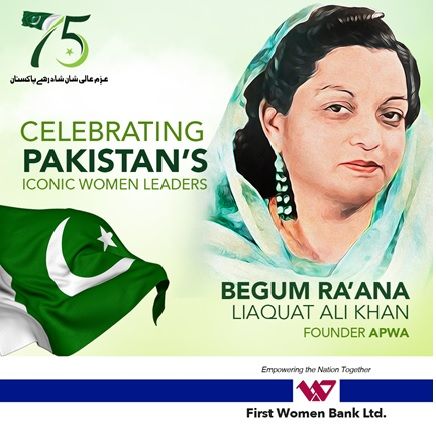Begum Ra’ana Liaquat Ali Khan – remembered as a leading woman politician and pioneering figure in the Pakistan Movement – played an instrumental role in the nation’s progress, and continues to be seen as a symbol of selfless service for the cause of humanity and uplift of women. Begum Ra’ana Liaquat Ali Khan commendably served as Economic Advisor to Quaid e Azam’s Pakistan Movement Committee pre-partition, and played an important part in creating political awareness amongst women. As the wife of the first Prime Minister of Pakistan, she launched programs for women’s development in the newly founded country. Shortly after the birth of Pakistan, she formed the Pakistan Women’s Voluntary Service to organize and coordinate women’s activities and was later given the rank of Brigadier in the Pakistan Women’s National Guard.
In 1949, Begum Ra’ana Liaquat Ali Khan formed the All Pakistan Women’s Association (APWA) to help empower Pakistani women in all aspects of life. In 1954, Begum Ra’ana Liaquat Ali Khan was also appointed Pakistan’s ambassador to the Netherlands, and she was the first woman of the Muslim world to hold this appointment; she later went on to be Ambassador to Italy and Tunisia as well. In the 1970s, Begum Ra’ana Liaquat Ali Khan was notably appointed the first woman Governor of Sindh. She also wasan active long-serving Member of the ILO (International Labor Organization) Committee of Experts on Conventions and Recommendations. Amongst her many accolades, she was awarded the Jane Adams Medal, Woman of Achievement Medal, Mother of Pakistan Award, Nishan-e-Imtiaz, Grand Cross of Orange Nassau Award, International Gimbel Award, Woman of the World Award by the Turkish Women’s Association, and the United Nation’s Human Rights Award.
Celebrating Pakistan’s 75th Independence Day, FWBL pays tribute to iconic women whose legacies are strongly interwoven in the fabric of the nation’s heritage. Their remarkable achievements, in their own unique way, contribute to who we are as a nation today.





